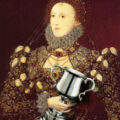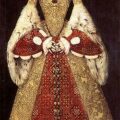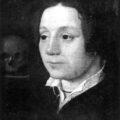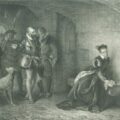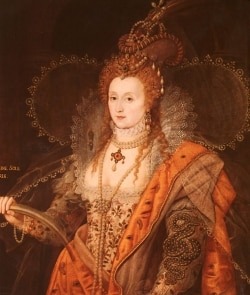
Elizabeth should have had a privileged life as a royal princess but instead she had a life of uncertainty. She went from being the treasured toddler of the King and Queen to being a royal bastard and being tainted by her mother’s reputation as a witch, whore and adulteress. From princess to bastard, from a baby who was blessed and fussed over to a little girl whose clothes were too small for her and who was ignored.
But her legitimacy was not the only problem that Elizabeth had to work through. Here are some of the other events that affected this woman:-
- Knowing that her mother was killed on her own father’s orders – I can’t imagine how that would make you feel and how it would affect your view on the world and relationships! Starkey writes of how Elizabeth never mentioned her mother and wonders if she was repressing the trauma of this event.
- Finding out that her young stepmother, Catherine Howard, had been executed just like her own mother.
- Being reconciled with her father, Henry VIII, after being ignored for years.
- Her beloved father’s death and the loss of security that his deat brought.
- Sexual abuse – Whether we believe that Elizabeth was in love with Thomas Seymour or not, he was her stepmother’s husband and took advantage of this girl. Creeping into her bed with his nightclothes on, tickling her and stroking her buttocks, slashing her gown to pieces with a sword or knife while she was restrained… all of these things amount to sexual abuse, whether Elizabeth found them thrilling or not. It does seem that Elizabeth was attracted to her stepfather, but, as Starkey points out, children often fall in love with their abuser.
- Being banished from her home – Catherine Parr sent Elizabeth away from her home both to protect Elizabeth’s honour and to protect her own marriage, but Elizabeth must have felt rejected.
- Being denied the right of succession by her half-brother – Edward VI went against his father’s wishes and, when he was dying, chose Lady Jane Grey as his successor, denying Mary and Elizabeth of their birthright.
- The execution of Thomas Seymour who could be seen as Elizabeth’s first love.
- Being used as a figurehead of rebellion – People who were dissatisfied with Mary I and her policies, used Elizabeth as their focus, whether she liked it or not. This put Elizabeth’s life in danger as Mary ordered her to be interrogated and imprisoned after Wyatt’s Revolt.
- The rivalry between her and Mary – The constant rivalry and arguing between them when Edward was King.
- The execution of Lady Jane Grey – Starkey says that “For Elizabeth, the event was searing. She was only three years older than Jane. And the rebels had acted in her name, not Jane’s. She feared, with good reason, that Mary would show her the same quality of mercy as she had shown Jane”.
- Being imprisoned – Elizabeth must have spent her whole time in the Tower in fear of her life and wondering when Mary would finally sign her death warrant. Even when Elizabeth was released from the Tower of London, she was kept imprisoned at Woodstock in Oxfordshire for nearly a year.
- The pressure that Mary put on her to confess her involvement in Wyatt’s Revolt.
- Seeing Mary’s pain and mental anguish as she suffered with a phantom pregnancy – Elizabeth was the Queen’s companion during this time.
- Thinking she was going to be forced into a marriage she did not want by her sister, Mary I.
- Seeing the religious persecution of her sister’s reign.
I really cannot imagine going through all these things in such a short space of time and then being declared Queen of a weak and troubled country, but Elizabeth was no victim, she used her past experiences to make her stronger and learned from what she’d seen. As David Starkey says:
“It was her lessons in the school of life that mattered more”
and as Elizabeth herself said in 1567:
“I thank God that I am indeed endowed with such qualities that if I were turned out of the realm in my petticoat, I were able to live in any place of Christendom”.
David Starkey calls Elizabeth’s youth her “apprenticeship” and you can see why!


